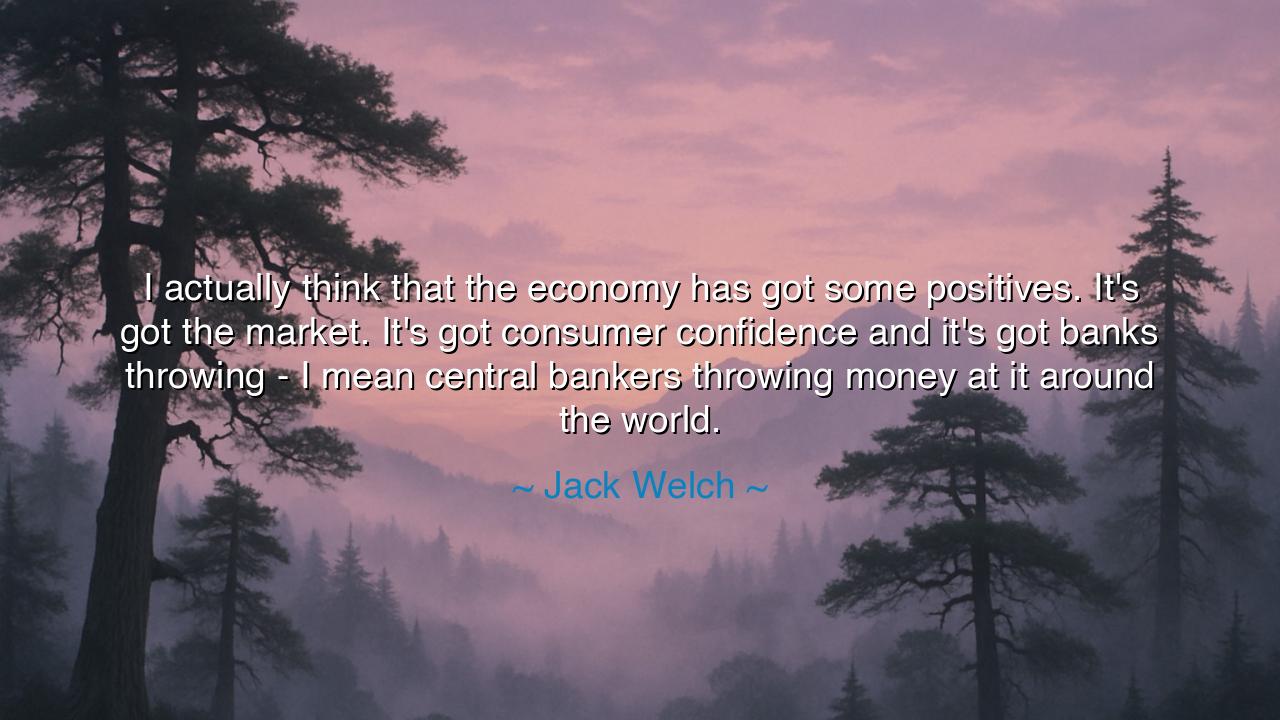
I actually think that the economy has got some positives. It's
I actually think that the economy has got some positives. It's got the market. It's got consumer confidence and it's got banks throwing - I mean central bankers throwing money at it around the world.






The words of Jack Welch—“I actually think that the economy has got some positives. It's got the market. It's got consumer confidence and it's got banks throwing—I mean central bankers throwing money at it around the world.”—reveal the eyes of a leader who looked at storms and still sought the signs of hope. He speaks here of an economy, vast and trembling, that though weighed down by challenge, still contains seeds of resilience: the power of the market, the trust of the consumer, and the intervention of the stewards of finance. In his words lies an ancient truth: even in times of uncertainty, there are positives to be found that can steady nations and inspire courage.
The ancients knew well the ebb and flow of fortune. Rome rose and fell upon the strength of its trade routes, the faith of its citizens, and the wisdom—or folly—of its governors. When famine struck, emperors opened their granaries to feed the people. When confidence wavered, leaders sought to restore trust with games, decrees, and reforms. Welch’s reflection mirrors this eternal cycle: though difficulties may abound, the market and the confidence of the people form pillars that, if preserved, can carry a society forward.
History provides us with vivid examples. Consider Franklin Roosevelt during the Great Depression. The world’s economy had collapsed, banks had failed, and despair gripped millions. Yet Roosevelt reminded the people that their greatest danger was not the crisis itself, but the loss of confidence. With the New Deal and the steady hand of leadership, he restored faith in the future, proving that when citizens trust again in their institutions and in one another, even the bleakest economy can revive. Welch, in his own time, saw the same truth: that consumer confidence is no small thing, but a force that can move mountains.
In his mention of central bankers throwing money at it, Welch also acknowledges a modern dimension of ancient practice. Kings of old minted coins, controlled grain supplies, and manipulated taxes to stimulate growth. Today, central banks act in similar ways, unleashing rivers of liquidity to prevent collapse. Welch’s words, though simple, highlight a reality as old as commerce: in moments of peril, leaders must act boldly, not timidly, to sustain the lifeblood of trade and labor.
Yet beneath his economic language is a spiritual truth: to look upon difficulty and still see positives requires a discipline of perception. It is easy to despair when numbers fall and markets falter. But to identify strength amid weakness is the gift of a wise leader. Welch reminds us that resilience comes not from perfection, but from recognizing the assets still at hand and building upon them. This is not mere optimism—it is strategy born of clarity.
The lesson for us is clear: in times of crisis, whether in nations or in personal lives, seek the positives that remain. Look to the structures that still stand, the trust that still breathes, the resources that still flow. Build upon them, strengthen them, and let them carry you through. Just as economies revive not by lamenting losses but by leveraging what endures, so too can individuals and families rebuild their futures by focusing on what remains strong.
So, dear listener, carry Jack Welch’s words as a guide. When storms come, do not fix your eyes only on the ruins, but on the pillars still standing: the market of opportunity, the confidence of spirit, the support of leaders and allies. Take these positives, however small, and let them be the foundation of renewal. For in every decline lies the seed of ascent, and in every crisis, the possibility of rebirth.






NQYen Nhi Quach
This quote makes me reflect on the interpretation of economic indicators. How reliable are metrics like market performance and consumer confidence in signaling genuine economic health? Could short-term optimism driven by monetary stimulus lead to complacency or risk-taking that eventually backfires? I also think about global implications—how do actions by central banks in one country affect emerging economies, and are the perceived positives equally distributed across the global economic system?
TT
I’m intrigued by the idea of focusing on positives in the economy, but it prompts questions about the broader context. Does central bank intervention truly reflect economic strength, or is it a response to underlying weaknesses? I also wonder how sustainable high consumer confidence is if it is heavily influenced by short-term liquidity measures rather than long-term job security, wages, and productivity growth.
ANViet Anh Nguyen
This raises questions about the role of central banks and monetary policy. Are these interventions a reliable method to sustain economic growth, or could they create long-term distortions? I also wonder how individual investors and small businesses experience these positives compared to large market players. Could the optimism highlighted by Welch mask systemic issues that aren’t immediately visible in consumer sentiment or market activity?
NVHoang Nguyen Van
Reading this quote makes me think about the balance between optimism and caution in economic commentary. Is Welch suggesting that the positives outweigh potential negatives, or is it more about identifying opportunities amid challenges? I also question how global interdependencies, such as trade, currency fluctuations, and debt, might affect these positives. Could strong consumer confidence coexist with economic fragility if underlying fundamentals, like employment or production, are not equally strong?
Aanhquocphan
I find this statement thought-provoking but somewhat concerning. While consumer confidence and market activity are positive signs, does throwing money at the economy risk creating artificial growth or financial instability? I also wonder whether such interventions benefit all sectors equally or primarily support large corporations and financial institutions. Could focusing on structural reforms alongside temporary monetary support create a more sustainable economic outlook?